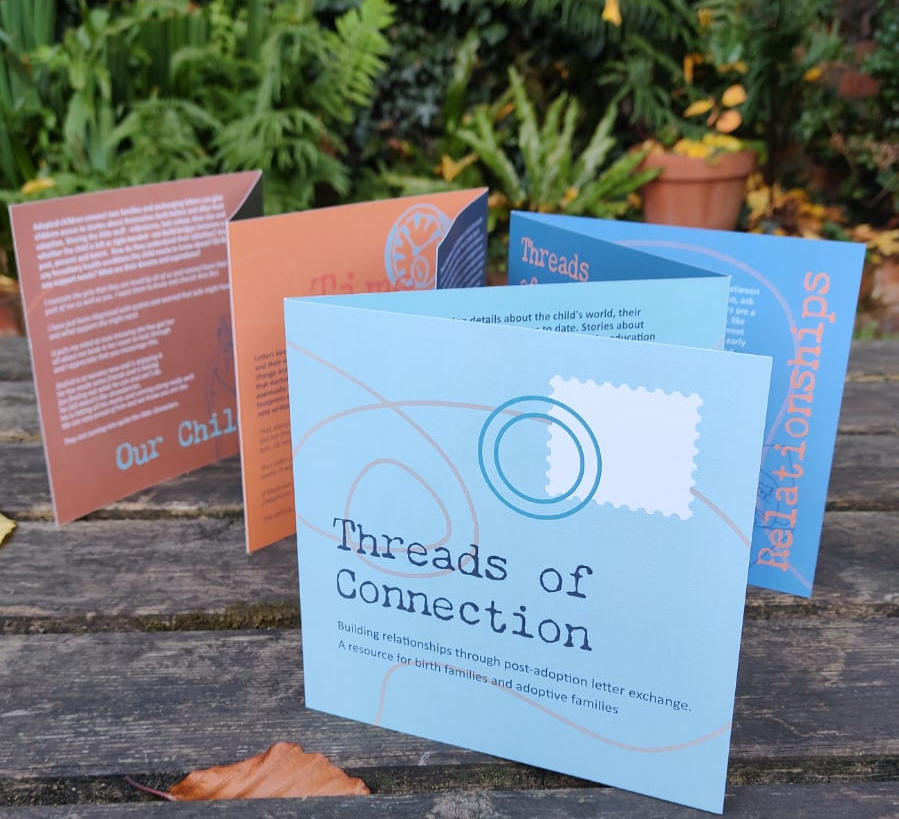Creating connections through post-adoption letter exchanges (Dr Lisa Morriss)

Threads of Connection printed resource for birth families and adoptive families
The importance for adopted children of continued contact with their birth families has long been recognised. The usual mechanism is an annual exchange of letters between the families, an imperfect solution which has a profound impact on the mental health and wellbeing of birth mothers. Now a collaborative project, funded by an ESRC Impact Acceleration Account (IAA), is changing how letter exchange is viewed and used.
Lisa Morriss is a lecturer in social work at Lancaster University. Her research had shown how existing arrangements fail both adoptive and birth families. She cites letters that never came, stopped coming, or seemed too formulaic, and highlights the way COVID-19 compounded the anxiety of ‘not knowing’. She wanted to do something about this problem – and the IAA Health & Wellbeing call proved a good fit.
“I tend to look for pockets of money you can be creative with and the IAA definitely fits that,” she says. “The funders don’t micromanage, you can just see where it takes you. That’s what we needed. Basically, we wanted to improve mental health and wellbeing by encouraging letter writing, but as we got into it we realised this meant avoiding ‘Us and Them’ thinking and looking at what adoptive and birth families have in common.”
Lisa built on her existing partnership with the Common Threads Collective of mothers living apart from their children at the Kirklees WomenCentre, and in particular with Siobhan Beckwith, a researcher who facilitates the group. Among other activities, the women of the collective deliver training to prospective adopters, giving them a unique perspective.
As Siobhan explains, the old term ‘letterbox contact’ was too passive. “Although we’d like to explore more direct methods, while we have letter exchange, we want to make the best of it – by getting people to see it as developing a relationship based on mutual respect and empathy, rather than as an uncomfortable duty.”
Working in group sessions, Lisa, Siobhan and the collective researched the guidance typically offered, including template letters, and decided that what was needed was something less prescriptive: a resource that could inspire communication and adapt as the child – and the relationship – grew.
Birth mothers from the collective and other charities were invited to imagine themselves as adopters and write letters to themselves: the ‘dream letters’ they would most like to receive about their child. Others who found this too difficult submitted examples based on actual letters received. The collective then worked as co-researchers to identify themes and hone the quotes down to key points under each.
The result was Threads of Connection, a printed resource for birth families and adoptive families that demonstrates not only the kind of content that makes letters work but also their potential for relationship building between the families. As Siobhan says, it is something tangible to lead with in making new contacts and raising awareness, but being a booklet gives it a further legacy. “People often keep their letters in a box. This can be tucked in with them, to help write next year’s letter.”
The IAA also funded sessions at which poet lisaluxx worked with the women of the collective, developing their confidence in presentation and expression. Siobhan, who called in favours at the University of Huddersfield to make a film of the poetry readings, sees the resource and the poetry as complementing one another. “The poetry was integral and a balm for all the difficulties we’d had. People could step into a creative space, take risks and get to the heart of it.”
Threads of Connection was launched at a hybrid event that saw the team live-streaming to over 100 attendees including birth families, adopters and stakeholders across the country, in addition to the annual conference of One Adoption West Yorkshire, a major agency whose Interim Head, Michelle Rawlings, tweeted: “What an amazing and powerful event. You created silence in a room of 120.”
Since then, Siobhan reports, they have been inundated with requests for the resource and invited to participate in conferences and training programmes. One local authority has said it is already relying on the resource to talk about letter exchange and other adoption teams are embedding the model into their training.
Lisa Morriss stresses the level of interest among experts and policymakers, including Professor Beth Neil of UEA, who tweeted “this is such a fantastic project – I loved the methods and outcomes” and Sarah Johal MBE, National Adoption Strategic Lead, who praised “a really helpful resource developed by birth mums for birth parents and adopters”.
Further partnerships are now in the pipeline. As Lisa says, “You never know when you set out what’s going to come from it. For that level of people working in adoption to see our resource and say they’re going to use it was quite remarkable!”
Download the booklet from the project website

